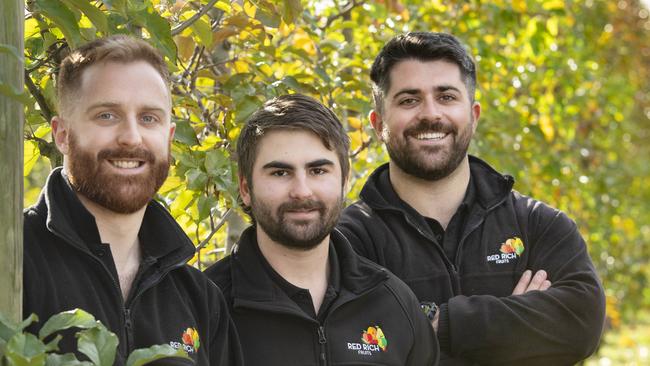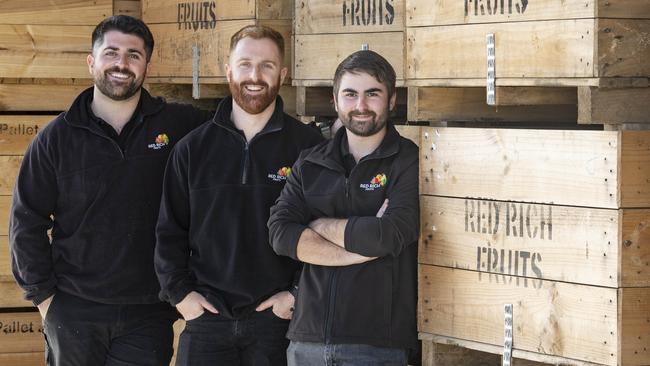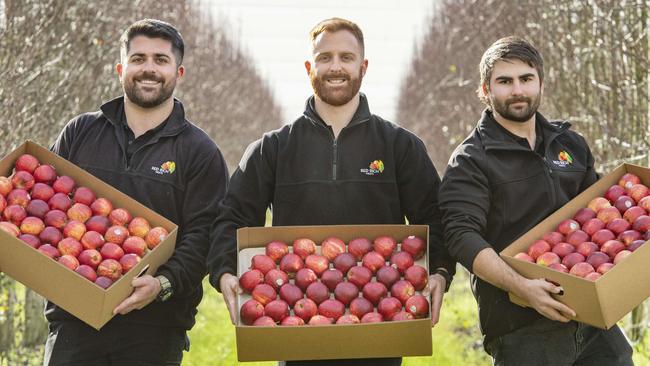Red Rich Fruits: Napoleone family continuing to grow their empire
With orchards, a cider operation, and a new apple variety on the way, see how the Napoleone family are taking Red Rich Fruits to the next level.
More than 70 years ago, the Napoleone family’s ancestors migrated from Italy to Victoria, and quickly set to work establishing market gardens in the Yarra Valley.
Growing whatever he could to provide for his family, Michael Napoleone bought the family’s first property at Coldstream, planting apples, stone fruit and pears in the 1950s and ’60s.
The company is now run by Michael’s son, Michael Jr, who has worked together with director Matthew Palise to expand into NSW and beyond.
Michael’s hard work has paved the way for fourth-generation grower Joe Napoleone, along with his brother Max and cousin Jack, to focus on expanding the family’s empire under the Red Rich Fruits banner.
Over the years the Napoleone's’ portfolio has branched into viticulture and tourism, establishing Punt Road Wines in 2001, Napoleone Cider in 2008 and The Farmhouse at Meletos luxury accommodation in 2015.
And the sky is the limit for these ambitious young men, who are set to launch a new variety of eating apple across Australia in 2024; the result of years of negotiations and developments with US stakeholders.

Joe’s efforts in expanding the Napoleonic empire have recently been recognised with accolades, including as a finalist in the Young Grower of the Year at AusVeg’s national horticulture awards.
But Joe sees his achievements as reflection of his family’s efforts across generations.
“We’re a family unit,” Joe said.
WIDE SPREAD
In Victoria, Red Rich Fruits’ enterprise spans four farms growing apples, pears, lemons and stone fruit, across about 404ha of orchards and vineyards in the Yarra Valley.
Fruit grown across the four main Yarra Valley sites is supplied into all major supermarkets.
A warehouse in Sydney, along with three citrus farms in Queensland and four mango farms in Darwin illustrates the Napoleone family’s far reach in Australia’s fruit and vegetable market.
But at the family’s core is a principled sense of working in the most efficient, sustainable manner.

“Every piece of fruit that comes into the shed, we use, so there’s no waste,” Joe said.
By point of illustration, Joe explained how excess rotting fruit is taken and mixed with marc (pressed grape skins and stems) from the winery into a fertiliser which is then turned back into the farm, closing the loop and encapsulating the ethos of the modern Napoleon dynast: moving into the future in a dynamic, expansive way, while also working in a sustainable fashion.
“That now allows us to use 100 per cent of what we make,” Joe said.
Apples and pears not destined for supermarket shelves are sent to the cider brewhouse, where they are turned into a range of ciders including a recently launched Rose cider that uses Shiraz grape skins from the family’s vineyard.
Cider production sits at about 350,000 litres of cider each year, across the range of pear and apple products.
The family also owns and manages 60 hectares of vines, producing wines of most varieties, including Chardonnay, pinot noir and Shiraz with an annual crush of about 2000 tonnes a year. A cellar door is operated next door to the Coldstream apple orchard, under the Punt Road Wines label.
COOL CLIMATE
Being based in a cooler climate region gives the Red Rich Fruits enterprise stability when it comes to seasonality and managing harvest.
Cool nights, especially in winter, known as cold chill hours, are good for bud development, while the lack of extreme heat in the summer provides good colour in fruit.
“We’re in quite a nice growing region,” Joe said. “The soil is conducive to it as well.”
Frost is a factor the family looks out for in the spring, with the capacity to burn flowers, buds and fruits.
Lemons are particularly susceptible to frost, Max said, with harvest for the citrus fruit kicking off in October to November.
“That’s a good marketing opportunity for us, as we get in before the northern states,” Joe said.
When it comes to the cycle for apples and pears, harvest commences in late summer.
Among the first fruits to be picked are the Red Rich Fruits’s range of Gala apples in mid to late February, with pears picked in mid-February.

The pruning period, which involves waiting for leaves to drop, keeps the team busy heading into winter, with pruning also a key task.
Buds will swell around early September, with bees brought in to pollinate fruit ahead of the blossom stage in September.
Pruning is a key focus for the family.
“We try to keep a tidy orchard, with everything raked and mulched immediately,” Max said.
“A neat orchard is a healthy orchard, and gets rid of disease risks.”
Harvesting platforms are being used for the first time this season, reducing the need for ladders and eliminating unnecessary up-and-down movements for employees.
“It makes labour more accessible,” Joe said.
“It’s a two-fold decision, it makes the business-side more efficient, but also it’s about being more sustainable, it’s helping our staff, which makes them happier, and can attract more people. There are so many layers to it and trying to tap into that as much as we can.”
While many parts of the agriculture industry have been plagued by labour shortages, Joe said Red Rich Fruits was “looking steady”.
Joe said 32 to 60 staff are employed under the PALM scheme across the Queensland and Northern Territory farms.
“It got a little skinny during Covid. We use a lot of contract labour at this property, and at our packing sheds. But we didn’t have as much competition as other growing regions,” Joe said.
DIVERSIFY TO THRIVE
Mandarins were added to the business about five years ago, with mangoes also started as part of a partnership, which Red Rich Fruits eventually bought out.
“We’re always looking for new lines, and ways to expand and build our portfolio,” Joe said.
“We’ve been doing apples and pears for many years now, and it’s good to get into other lines.
“The mangoes were a big opportunity, as we get the first crop of the season, and we’re able to hit the supermarket shelves early and capitalise on that early market.”
Depending on the season, mangoes are picked in August.
He said his family had always looked for ways to expand the business.
“They did whatever farming they could at the start,” Joe said.
“Beans, vegetables, livestock, whatever they could do. Even as little kids on the farm there were still sheep. We’re a little more focused these days.”
The next venture on the cards is a planting of more than half a million Cosmic Crisp apple trees, as part of a $27 million investment in the new variety.
Cosmic Crisp trees are being grown by 13 growers including the Napoleone family, at Manjimup in Western Australia, the Yarra Valley in Victoria and Batlow in NSW.
The first commercial crop will be released in June and July next year.
The move is anticipated to grow revenue by about 50 per cent in five years.
The variety, which is a red apple created by Washington State University, is a blend between the Honeycrisp and Enterprise cultivars.
And in a savvy business move, Red Rich Fruits has the only Australian commercial licence to grow the fruit.
“That allows us to determine who grows it, where it’s grown, and we are responsible for the marketing,” Joe said. “We’re really excited, this will be our first apple we’ll have control of. We’re looking at 560,000 trees in the ground nationwide. We’ve focused on cooler-climate regions to try and control consistency.”
FAMILY PRIDE
Whether it’s branching into new varieties or honing production of their traditional fruit lines, at its core the Napoleone family venture remains focused on doing a job well, standing shoulder to shoulder with family.
“We’ve always had pride growing up on the farm,” Joe said. “We built this shed in 2019, which is a big undertaking, to upgrade from where we were.
“We’re always looking for opportunity, we don’t want to be stagnant. And the diversity of what we’re doing is also exciting.”





